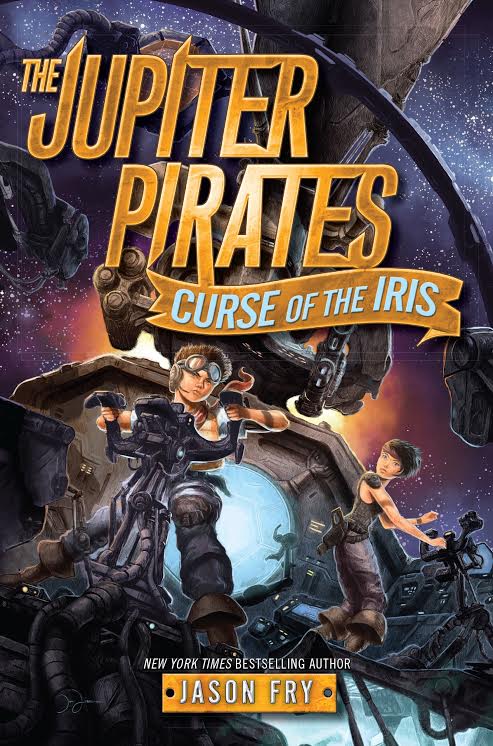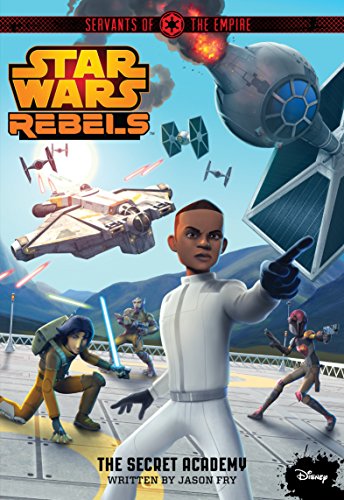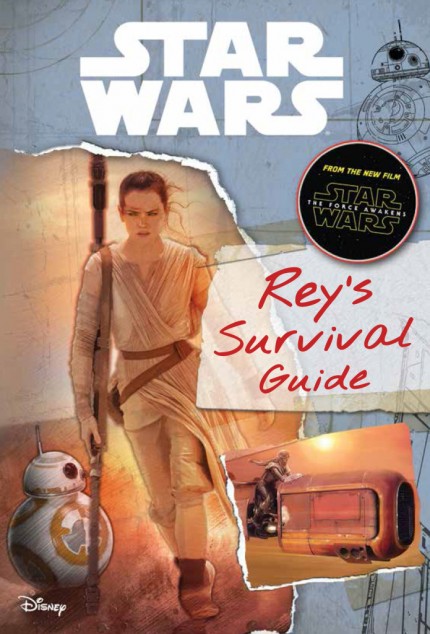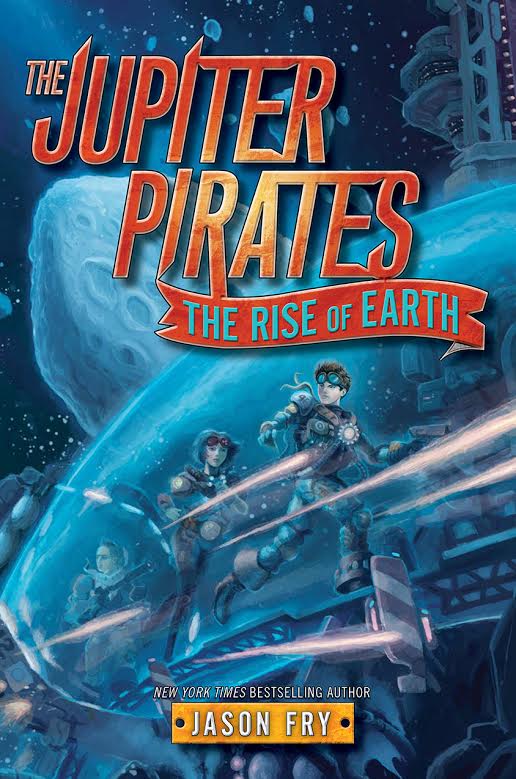 In part one of our latest interview with Star Wars dynamo author Jason Fry, we discussed his two recent Journey to The Force Awakens tie-in books, The Weapon of a Jedi and Moving Target (alongside Cecil Castellucci). Today we’ll move on to his most recent solo release, Servants of the Empire: The Secret Academy (expect us to have more on that next week as well), but first, we caught up on Jason’s own original series The Jupiter Pirates, whose third book, The Rise of Earth, comes out next year—and whose cover Jason was kind enough to share with us for its world premiere!
In part one of our latest interview with Star Wars dynamo author Jason Fry, we discussed his two recent Journey to The Force Awakens tie-in books, The Weapon of a Jedi and Moving Target (alongside Cecil Castellucci). Today we’ll move on to his most recent solo release, Servants of the Empire: The Secret Academy (expect us to have more on that next week as well), but first, we caught up on Jason’s own original series The Jupiter Pirates, whose third book, The Rise of Earth, comes out next year—and whose cover Jason was kind enough to share with us for its world premiere!
Man, that was a lot of titles for one paragraph.
So Jupiter Pirates is, in many ways, the age of sail in space. There are some family tensions in the second book, Curse of the Iris, and the tension mirrors the long-running argument over whether the Hashoones are pirates or privateers. The family has done and does some shady things in this book, and Tycho is sort of the audience surrogate in saying “hey wait, this isn’t right”—but his family doesn’t always see eye-to-eye about it. How do you romanticize age of sail in space without necessarily romanticizing the awful things that pirates do? And that’s leaving aside people like Mox who are just the worst, of course.
Hmm. Good question. I suppose this is a case where the built-in guardrails of writing kids’ fiction are a good thing – you’re not going to see pirates woolding someone (Google that with caution – it’s upsetting) or raping/slaughtering people. Bad things happen, but they’re mostly offscreen or implied. Which is honestly the way I prefer to work anyway.
Anyway, I think the more interesting debates in The Jupiter Pirates – for a reader of any age – are about other decisions to be made about right and wrong. What’s the right thing to do when you discover you don’t agree with a cherished family tradition? How about when you’re fighting for a larger cause that may or may not justify unsavory actions? (Which is the same question Cecil and I addressed in Moving Target, come to think of it.)
In my experience kids enjoy grappling with those larger, murkier questions. Which I guess gets me back to something I’m adamant about when writing for kids. Kids have great radar for preaching or being talked down to, because it happens to them all the time. And the idea that they can’t handle morally complicated questions is insulting to them – of course they can. As a kid I hated books that oversimplified things or stopped telling stories and started lecturing me. I’d throw those books across the room and find one that gave me credit for being able to think. Those are the kind of stories I try to write – not just for kids but for any audience.
The political plotline kicks up another notch in the second book, with rumblings of potential hostilities with Earth and instability in the Jovian Union. We’ve seen a lot of the outer systems, and only a brief look at civilized space. Will we learn more about Earth—what it’s like, and why the Hashoones and other Jovian-minded spacers don’t want anything to do with it? I’m quite curious to learn about this Earth monarchy thing that’s going on. I imagine the third book will go more into it of course but…any hints for us?
The Rise of Earth does go into that a bit – we’ll meet some Earth privateers, marking a dangerous escalation of hostilities, and Tycho has what I hope is an interesting argument with a young woman from Earth about the conflict between her planet and the Jovian Union. Which is part of an interesting new dynamic for Tycho, in which he’ll face choices that aren’t any easier than the ones he’s dealt with already. At the same time, Yana and Carlo are thinking about the family tradition, and have come to their own conclusions about what’s best for themselves and the family. Let’s just say the three siblings end up wanting very different things.
The current plan is we’ll actually visit 29th century Earth – and maybe Mars – in the fourth book. We’ll see the emperor and his court, and get some sense of how things got to this point. There are scenes from that story that I cannot wait to write.
Oh, since you so kindly asked about The Rise of Earth, want a first look at the cover? Here it is.
Thanks for sharing, looks great! Something I find interesting about Jupiter Pirates is that while it’s entirely your own thing, it’s still basically another “young adult” series like Servants of the Empire. I’ve always found it odd that when a fan-favorite Star Wars author emerges somewhere other than in the “adult” novels, people go ahead and assume that’s the real goal: “when are they gonna give Jason Fry a novel already??” The implication seems to be that writing anything else doesn’t quite count, and authors like you are being denied validation somehow. So I guess my question is, how badly do you even want to write full-length novels, Star Wars or otherwise? Speaking for myself as a reader, I’d be content with things like Servants in perpetuity, but is that enough for you as a career?
Here’s an experiment I’d love to see: put the four Servants of the Empire books into an omnibus edition, give it an “adult” cover and see how readers react. I mean, the writing in those books really isn’t substantively different from the writing in “The Levers of Power”, or at least I don’t think it is. But people react differently to the two because they’re marketed differently.
To be fair, I do this too. As readers, we’re going to react differently to a copy of To Kill a Mockingbird depending on whether it’s packaged for kids or adults, or whether it was produced in the 60s or the 70s or today, or whether it’s a movie tie-in or not. Ever been in the bookstore and passed up the movie tie-in edition of a novel in favor of something that looks more literary? I have. It’s a little silly, but our perceptions get shaped by marketing more than we’d like to admit.
I’d love to write a full-length novel, for any number of reasons. But the most important one is because I know those folks and think it would be really fun working with them to tell a Star Wars story.
But there’s a long list of really talented writers who have the same wish. The bottom line is that I love telling stories, in whatever form and for whatever perceived audience. I’ve been enormously lucky – and worked my butt off – to be able to pay the bills that way. It’s what I wanted to do as a kid, and every day I get to do it makes me really happy. And energized and excited and grateful and everything else.
Over the last year, I’ve had cause to greatly rethink the way I talk about character diversity in Star Wars, one of my favorite topics. A huge part of that was due to Servants‘ telling of a powerful story about discrimination and homogeneity—especially in the first book, Edge of the Galaxy—with an almost entirely human cast. I owe you a debt for demonstrating that there’s more to telling a progressive story than raw numbers, but one thing that did stand out to me was the apparent lack of female cadets among the named characters in the Lothal academy (and only one notable female recruit at the Arkanis academy). I think the series largely made up the disparity among the instructors and non-Imperial characters, but I can’t help but wonder what your thinking was here—was the number of boys deliberate on your part, an editorial decision, or was it as simple as the TV show not having the budget for a female cadet character model?
 Hmm. Bear with me as I think through something I did unconsciously.
Hmm. Bear with me as I think through something I did unconsciously.
I suppose it goes back to what I see as the responsibilities of a writer handling an adaptation. The cadets were introduced in Rebel in the Ranks, which isn’t strictly an adaptation, but took its direction about the Imperial Academy from the show.
With adaptations I go back to a rule of filmmaking, which is that the audience only knows what it sees on the screen. A corollary to that, I believe, is that what you tell off the screen has to be consistent with what’s shown on it. You can expand on what’s on-screen or explore nuances of it, but if you undermine or contradict it, you haven’t done your job – in fact, you’ve pretty much done the opposite of what you were asked to do.
It’s a related point, but you used to see a lot of proposed retcons that ignored this principle: “Well we only saw the Executor in Return of the Jedi but in fact there were ten SSDs at Endor, and…” No. Absolutely not. That might work from a world-building perspective, but it’s inadmissible from a storytelling perspective. If you want lots of SSDs in Imperial service that’s fine, but you can’t get there by saying they were lurking just off-screen at Endor, because you’re undermining the film that’s the heart of all that storytelling.
So, back to Rebel in the Ranks. In the show it sure seems like the cadets were mostly male. (Though in retrospect I could be wrong about that – without peering creepily at cadets’ jumpsuits, that could be the same misconception as discussing stormtrooper ranks based on armor.)
So I guess that’s the reasoning, now that I’ve thought it through: It was my job to be faithful to what we saw on the screen, and that led me to be conservative in how much leeway I took, so I opted to create a couple of all-female cadet units on Lothal and do the same on Arkanis. Based on my own proposed rule above, you could argue that was too much leeway. But I think it’s faithful to what we saw in the Mandalore episodes of The Clone Wars and what we’ve learned about female stormtroopers. Plus I can take a bit of refuge in your note about character models on the show – I know why Oleg never took off his helmet, but still found it entertaining than he didn’t.
This is kind of a fan question and a pro question mashed together: have you read Lost Stars yet? Claudia Gray covered a lot of similar territory to Servants in the first third of her book, and I’d love to know what you think of the many facets she gives to the “average” Imperial recruit. Having recently finished that added additional layers to The Secret Academy, as well, and increased my sympathy for Chiron, and the position he’s being put in here. Do you think someone like him can be successful in a position of power within the Empire? Can good people carve out little spaces for themselves in this society and retain their souls, or will it destroy them all in the end?
I haven’t read Lost Stars, to my frustration. Or read Greg Rucka’s Han book, or the Marvels. Partially because I’ve been really busy, and partially because I’m a bad person. Does it help if I say I’m looking forward to reading all of the above?
Re Chiron, the easy answer is that I think people can carve out a space as you say. I’m sure there were any number of Imperials who brought law and order to miserable worlds in the Outer Rim, allowing people to live far better lives than they had before.
But what kind of space is that? There’s a gamble there and a moral trade-off. The gamble is that you’ll be asked to do something morally wrong – quite possibly a small something that you can justify through mental contortions. Until it leads to something else that’s worse, and that leads to something else that’s worse still, and pretty soon you’ve gone numb to the justifications and become a person you could never have imagined becoming. Or even if that doesn’t happen, you’re part of a system that is fundamentally wrong. Chiron’s belief is that occasional evil is an acceptable price to pay for the widespread introduction of order, but Zare tries to make him see that the reality of the Empire is the opposite – the widespread introduction of order is a precursor for unchecked evil.
 Looking into the future, we know you’ve got a few The Force Awakens tie-ins coming up; two “replica journal” books and TFA’s entry in the always-interesting Incredible Cross-Sections series. But I don’t want to trigger your spoiler implant, so instead I’m going to ask about next year—anything you can tease about future plans? What are the odds of us seeing Zare Leonis again?
Looking into the future, we know you’ve got a few The Force Awakens tie-ins coming up; two “replica journal” books and TFA’s entry in the always-interesting Incredible Cross-Sections series. But I don’t want to trigger your spoiler implant, so instead I’m going to ask about next year—anything you can tease about future plans? What are the odds of us seeing Zare Leonis again?
I honestly don’t know. Readers of The Secret Academy will know there are some loose ends at the end of that book. Partially that was by request and partially that was because a wise writer always leaves at least a few possibilities open.
I already miss Zare and Merei and would love to tell the story of more of their adventures. But I’d also be pretty happy to see one or both of them appear in some new story created by other folks. And if neither thing happens, I hope The Secret Academy did them justice and brought their story to a satisfying conclusion. That’s a writer’s job and I hope I pulled it off.
That’s all, folks—thanks for everything, Jason! By the way, as he mentioned above, can you believe that Jason had another Star Wars story out this month? Check out the A New Dawn / Tarkin bind-up Rise of the Empire for three awesome exclusive short stories, including “The Levers of Power”, a Rae Sloane story set during the Battle of Endor and leading into Aftermath. Meanwhile, Jason’s The Force Awakens tie-ins will be out December 18th, natch, and Jupiter Pirates: The Rise of Earth comes out next June. Now, in you’ll excuse me, I need to rest my “italics” button…


If LFL/whoever the publisher is were to put out a compilation of the SotE books, I’d buy it in a heartbeat.
Great interview!
It does seem like a no-brainer.